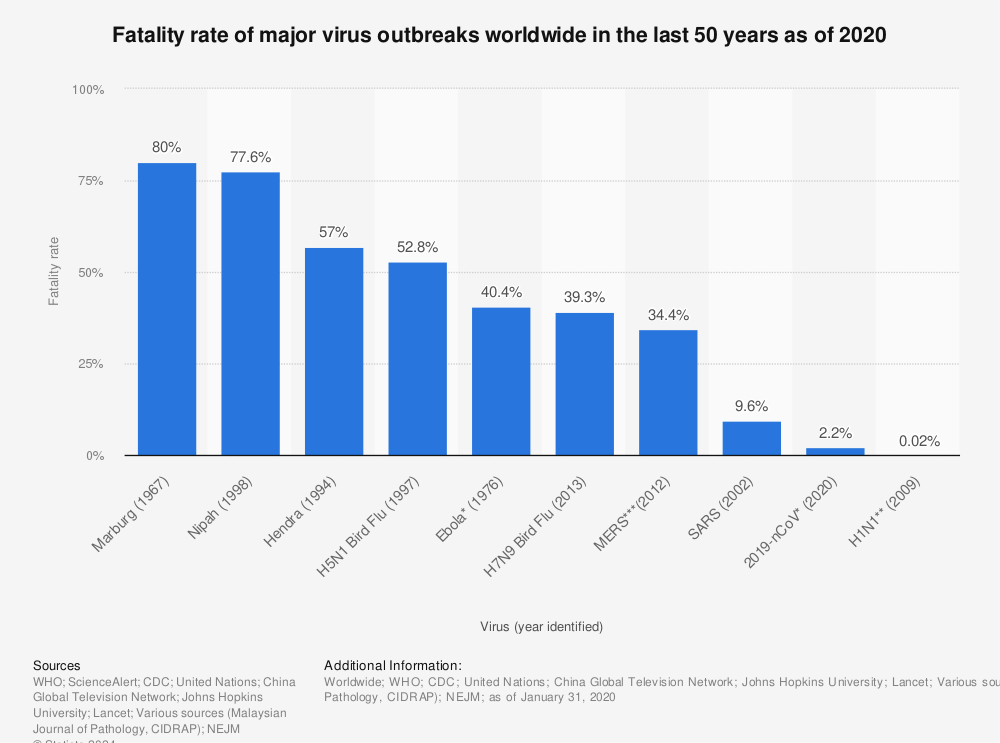How to Make A Successful Career in The Field of Virology?
“Power of nature can make fun of the power of man at any time“
These strong words coming from the pen of a great thinker and philosopher have truly complied with their meaning, where presently almost the entire world is confronting the most dreadful virus that appeared so far in history, “The COVID -19” coronavirus disease 2019. This new virus and disease were unfamiliar before the outbreak instigated in Wuhan, China, in December 2019.
This deadly virus belongs to a large family of viruses called coronaviruses which may cause ailments in humans or other animals. In humans, several coronaviruses have been identified causing respiratory infections stretching from the common cold to more severe diseases such as Severe Acute Respiratory Syndrome (SARS) or Middle East Respiratory Syndrome (MERS) but this recently emerged new virus is far more aggressive than all other members of its family and has left world helpless against this pandemic.
This COVID-19 outbreak has created a comprehensive health catastrophe that has had an integral impact on the way we perceive our world until now. It has brought turbulence all over the world turning the lives of humans upside down. The estimated mean infection rate is 2.5. The rate of infection and arrays of transmission is so scary, driving the worldwide governments and health authorities to put in place the strictest safety measures applied ever to prevent the spread of this virus. Whether it is to refrain humans from depicting the inherent behavior of finding solace in the company of others or it is about bearing a hidden fear of getting infected, these conditions are leaving people in the state of complete dilemma imposing everyone to stall and think “What will happen in the near future”
Although we fail to answer this question at present, however, it can be stated firmly, whenever the world will be declared to come out of this health and economic crisis, governments will have to give more importance to research fields motivating more and more students to embrace successful careers in the field of parasitology or more specifically virology.
Currently, scientists have been unsuccessful to design a specific vaccine or treatment for COVID-19. Undeniably the World Health Organization (WHO), the specialized agency of the United Nations responsible for international public health is trying hard to combat this outbreak and there are many ongoing clinical trials evaluating potential treatments but nothing has emerged successful so far.
In this context, a rational question could be asked, “Within these circumstances of the physical threat as well as the era of fear and ambiguity, what can be the role of the researchers at social and societal levels?
Virologists, trained researchers play a significant role in public health and extend their contribution to conduct epidemiology studies. Nevertheless, they can provide a platform to construct sound health policies at the international, national, state, or local levels.
Following this COVID pandemic, it will become even more prominent in the upcoming years, as governments will stipulate more budgets and resources to work on the prevention of disease before it takes the shape of this freak dragon. This emphasis on preventive health is what will determine the demand for more and more researchers and scientists, including those trained in virology.
Enhance Your knowledge of viruses & COVID-19 – Register Now
“Viruses”, arduous entities to deal with!
Primarily, this microscopic species is notorious for being the cause of infection and contagion. Viruses may follow several routes of infection, stretching from human behaviors to insect bites. Medical history presents widespread events of illness, pandemics, and death caused due to viruses in the past.
Viruses need to be watched constantly!
Humans have been battling viruses since before medical science and scientists had even evolved into the present modern form. In this process, some potent vaccines and antiviral drugs were discovered by the virologists timely to prevent few menacing infections from spreading widely for instance smallpox was successfully eradicated ridding the world of new cases.
But we are still a long way from conquering the viruses completely. Several deadly viruses have claimed thousands of lives in recent decades, few of them have been found to be hopped from animals to humans and elicited substantial outbreaks.
What is “Virology”?
Virology is the field of biology which is concerned with the study of viruses, these submicroscopic, contagion particles having genetic material contained in a protein coat including other virus-like agents. It may be understood as a scientific discipline concerned with the study of viruses and viral diseases, comprising the dissemination, biochemistry, virulence, anatomy, molecular biology, ecology, growth, evolution, genetics, clinical characteristics, and impacts of viruses. It is all about understanding viruses ranging from familiar infections like smallpox or chickenpox to novel and evolving infections like Ebola, Zika, or the most recent COVID-19.
Who are “Virologists”?
Virologists are scientists who drive research on various aspects related to viruses or medical doctors who administer the diagnosis, management, and prevention of viral infections. A virologist may portray the role of both a scientist and a physician. Researchers may work at the bench in laboratories along with providing counsel to the workforce across many different human or animal health service sectors. In the Wake of diversified conduct of viruses, the virologists also reflect diversity in their assignments.
Contribution of Virologists towards medicine!
- Virologists diagnose viral infections, discover the modes and severity of infections.
- They accumulate information about viral genetics, viral replication cycles, and host and tissue interactions.
- They discover insights into host innate and adaptive immune responses and how viruses alienate these responses while manipulating other cellular processes to their benefit.
- They discover antiviral drugs and investigate the pharmacological response of viruses to these drugs and the development of drug resistance in viruses.
- They offer expert assistance to medical professionals in hospital wards as well as to other government health authorities.
- In foreign countries, they are often involved in personally managing patient care, specifically of patients suffering from obstinate infections of HIV and/or viral hepatitis.
Registrations Open For Virology & COVID 19 Certification Course
Opportunities for virologists!
Virologists may work in public health and life-saving medicine where they are required to provide guidance on immunization and vaccine use.
In the state of a viral outbreak, virologists may work step to step with the hospital’s infection control team, guiding house staff about the magnitude of transmission and finding measures to combat it.
There is a multitude of opportunities available in this sector.
Where a Virologist can find placements?
- Virologists are usually functional in research institutions and organizations.
- Virologists can be placed as professors in academic institutions like universities,
government agencies like CSIR, colleges, or healthcare organizations like medicals or hospitals. Many scientists prefer to divide their career in between research and teaching.
- Virologists may also embrace scientific writing as their career.
- As a virologist, you may undertake additional training or certification courses related to pharmaceuticals and thus incorporate yourself in pharmaceutical companies or self – business.
- Virologists may be employed in industry research and contribute to developing new medications or antiviral drugs.
- Virologists may step into the Public Healthcare sector also.
Qualifications to get a successful career in the field of Virology?
- You must have studied biology, chemistry, and physics at the high school level
- At the bachelor’s level, you must have studied Life science or related specializations although microbiology is preferred to be part of the main course discipline. Students pursuing MBBS, Biomedical Sciences, or Biotechnology at the graduation level can also choose virology as a life career.
- At the post-graduation level, you could pursue any of the following mentioned streams: Microbiology, Medical Microbiology, Immunology, or Virology.
- Holding a postgraduate degree in Microbiology will ease your path to be a research associate, supervisor or laboratory executive, or mentor on the civic college level.
- Eventually, a Doctoral Degree as PhD in Microbiology with specialization in virology or Infectious Diseases is preferred for the highest positions in this field as a professor at a college/university level, research scientist, or research director.
What you will learn during your master’s course in Virology?
M.Sc. Virology program aims to build in students the awareness about the basic concepts and scientific disciplines that are required to screen, avert, and detect contagious viral infections. It also offers analytical thinking using logic to solve work-related issues and problems. Students are imparted technical training including the following aspects:
- Tissue Culture Techniques
- Viral cell interaction and replication
- Oncogenic viruses and virus latency
- Virus Antigen Detection
- Viral pathogenesis
- Gene Regulation and Recombinant DNA technology
- Viral encephalitis
- Veterinary and agricultural viruses
Colleges offering Virology courses in India
- Amity Institute of Virology and Immunology, Noida
- Manipal University, Karnataka
- Savitribai Phule Pune University, Maharashtra
- National Institute of Virology, Pune
- Sri Venkateswara University, Tirupati
- Karpagam Academy, Coimbatore
What are the skills needed to be a proficient virologist?
- Terrific communication skills – To have a successful career in the field of virology, you will be expected to work with many people at research labs, hospitals, public health sectors so you must possess the abilities to express your knowledge in the most pellucid manner.
- Investigative and prurient mind – You must be competent to design and precisely interpret an array of experiments and their results and thus to conclude the significant investigations.
- Good immunity– Since you will be handling viruses or virus-infected samples you must demonstrate robust immunity to infections.
- Possess a composed mindset – You will be dealing with the most renegade species the viruses which are well known to undergo mutations and recombination and thus leading to re-emerging threats to humanity. In the case of pandemics, work can become pressurized and unforeseeable.
- Need to master molecular Biology skills – You are expected to excel in techniques like Cell Culture, Assay development, PCR, handling other laboratory equipment and tools consisting of air samplers or collectors, infrared spectrometers, HPLC, other analyzing and sterilizing equipment.
Prospects of being a Virologist! – A Successful Career in the Field of Virology
Elevated Job demand in the near future
In the year 2017, the global virology market was estimated at $1693 million and is expected to grow at a Compound Annual Growth Rate of 5.4% during the period of 2018-2023 and after COVID 19 pandemic, it is expected to explode even more. There is nothing wrong with saying that during such epidemics, the entire world starts looking towards the researchers, virologists, microbiologists with a vision of hope. According to the US Bureau of Labor Statistics (BLS) by 2022, there will be a 10% rise in demand for epidemiologists having expertise in domains such as virology. A 15% boost in job demand for specialists in the field of environmental science in the same period is expected subsequently follows the rising trend for microbiologists who can boast of having a 7% increase in job demand worldwide. Nevertheless, virologists who are trained in holding statistical or other bioinformatics tools will enjoy a 27 % increase by 2022.
Decent Salaries
According to the salary survey-based data collected directly from the employers, an entry-level virologist holding 6 months to 3 years of experience may earn an average salary of ₹4,81,870 whereas a senior level virologist with 8+ years of experience may earn an average salary of ₹10,44,487.
Registrations Open For Virology & COVID 19 Certification Course
Job security
Primarily the work in this field is serious laboratory research which is not only exciting but may turn influential and prove life-changing when dreadful viruses and viral pandemics are standing at the doorstep of our country. If you get employed with the public health field sector or work for or with government agencies you can definitely relish the high degree of job security with god salary amounts in hands.
According to an estimation, the world population will reach 11 billion by 2100, and certainly, this will result in intense challenges involving disease outbreaks caused by emerging viral strains or other parasites. It would be better to keep an eye on the new viruses that may bring the subsequent pandemic in the future and thus becoming prepared with effectual cures for them beforehand. More funds will be offered for research projects that have a direct influence on the benefit of the public in the recent future.
The governments and health policymakers have already started to believe that “The best preparation for tomorrow is doing your best today”. This could be considered as the best time to motivate yourself to make a successful career in the field of virology, to contribute your share in saving this beautiful world from the terror of obstinate viruses.
 is an ]experienced faculty at BioTecNika with a keen interest in keeping herself motivated to learn new and more. The above article is one such example of her deep knowledge of trending innovations in the life science & medical field. She has expertise in Biotechnology and Microbiology and completed her Ph.D. in Biotechnology. Dr. Nidhi has also been awarded at several workshops and conferences and has publications in reputed international journals.
is an ]experienced faculty at BioTecNika with a keen interest in keeping herself motivated to learn new and more. The above article is one such example of her deep knowledge of trending innovations in the life science & medical field. She has expertise in Biotechnology and Microbiology and completed her Ph.D. in Biotechnology. Dr. Nidhi has also been awarded at several workshops and conferences and has publications in reputed international journals. 



























 government agencies like CSIR, colleges, or healthcare organizations like medicals or hospitals. Many scientists prefer to divide their career in between research and teaching.
government agencies like CSIR, colleges, or healthcare organizations like medicals or hospitals. Many scientists prefer to divide their career in between research and teaching.





